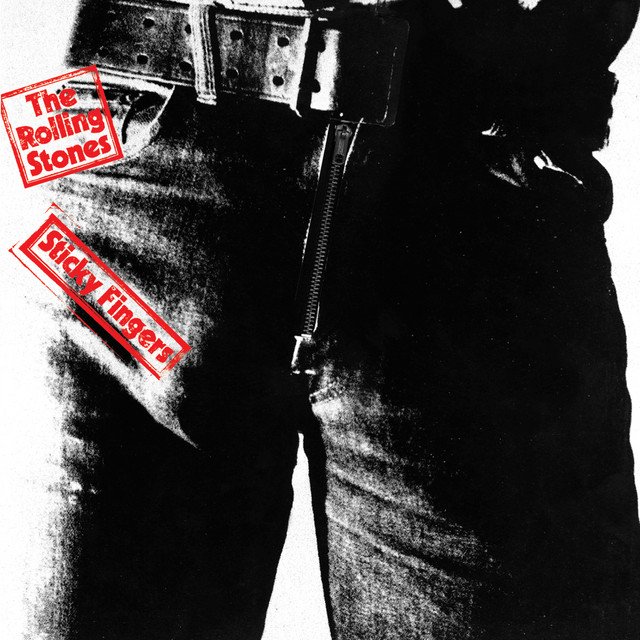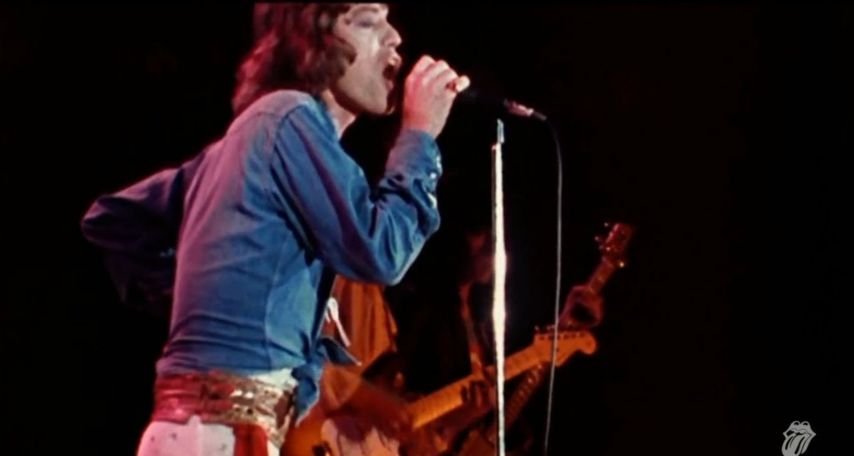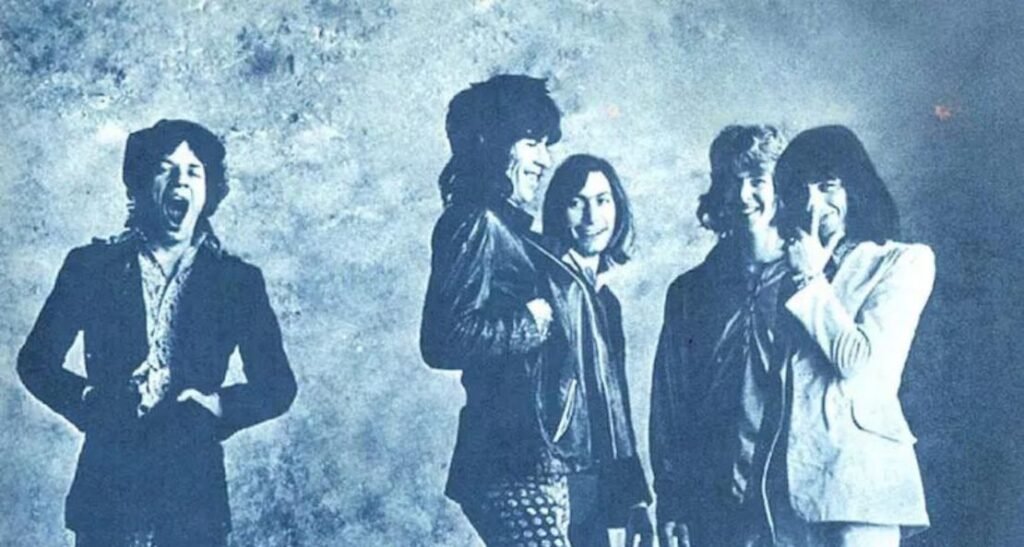The Rolling Stones’ iconic song, Brown Sugar, is a complex and controversial piece of music history.
Released in 1971 as the lead single from their album Sticky Fingers, the song quickly climbed the charts, reaching number one in the United States and Canada.
Despite its undeniable popularity, Brown Sugar has faced much debate and scrutiny over the years because of its provocative lyrics and themes.

The Sound of “Brown Sugar”: A Blend of Blues, Rock, and Soul
Brown Sugar is not only known for its controversial lyrics but also for its distinctive sound that blends elements of blues, rock, and soul.
The song opens with a powerful and instantly recognisable guitar riff by Keith Richards, setting the tone for the gritty, blues-rock energy that permeates the track.
Bill Wyman’s bassline provides a solid rhythmic foundation, driving the groove forward with a pulsating beat.
Charlie Watts’ drumming is both steady and dynamic, propelling the song with its infectious energy.
Bobby Keys’ saxophone solo adds a touch of soul and a hint of danger, while Ian Stewart’s piano brings a boogie-woogie element to the mix, enhancing the song’s danceable quality.
Mick Jagger’s vocals are raw, passionate, and full of swagger. His delivery of the lyrics is both seductive and menacing, capturing the complex themes of the song with a bluesy rock cadence.
The backing vocals add depth and texture, creating a soulful atmosphere that complements the song’s gritty instrumentation.
The combination of these musical elements creates a sonic landscape that is both captivating and disturbing.
It’s a sound that perfectly embodies the song’s themes of desire, danger, and the dark underbelly of history.
Behind the Music: Release, Writers, and Producer

“Brown Sugar” was primarily written by Mick Jagger during the filming of “Ned Kelly” in 1969.
The exact inspiration for the song remains unclear, with various figures claiming to be the muse behind the lyrics.
According to Marsha Hunt, Jagger’s then-girlfriend and mother of his first child, the song was written with her in mind.
However, former Ikette Claudia Lennear disputes this claim, asserting that the lyrics were inspired by her relationship with Jagger at the time.
Interestingly, the song was originally titled “Black P*ssy,” but was changed to “Brown Sugar” before release.
The Rolling Stones recorded the track during a three-day session at Muscle Shoals Sound Studio in Sheffield, Alabama, from December 2-4, 1969.
The song was not released until over a year later due to legal issues with the band’s former label.
An alternative version of “Brown Sugar” was recorded on December 18, 1970, at Olympic Studios in London during a birthday party for Keith Richards and Bobby Keys.
This version features appearances by Al Kooper on piano and Eric Clapton on slide guitar.
Previously available only on bootleg recordings, this alternative version was officially released in June 2015 on the Deluxe and Super Deluxe editions of the reissued “Sticky Fingers” album.
At the request of guitarist Mick Taylor, who had joined the band as Brian Jones’ replacement in July 1969, the Stones debuted “Brown Sugar” live during their infamous concert at the Altamont Speedway on December 6, 1969.
Chart Performance and Critical Reception
Upon its release, “Brown Sugar” became an immediate commercial success.
It reached number one on the Billboard Hot 100 in the United States and the RPM Top Singles chart in Canada.
In the United Kingdom and Ireland, it peaked at number two. The song also charted in the top 10 in several other countries, including Australia, Austria, Belgium, Germany, the Netherlands, Norway, and Switzerland.
Critical reception of “Brown Sugar” was largely positive, with many praising its infectious rhythm and memorable guitar riff.
Writing for Sounds in 1971, Penny Valentine lauded “Brown Sugar,” stating that it was her “choice as the best track.”
Cash Box described the song as returning to “the fresh blues sound of the team’s pre-Satanic days” with a “sax break, gritty wailing and the unique stones rhythm work.”
However, the song’s lyrical content has been a point of interest and controversy since its release.
Described by rock critic Robert Christgau as “a rocker so compelling that it discourages exegesis,” the song’s popularity has often overshadowed its provocative lyrics, which explore a number of controversial subjects, including slavery, interracial sex, cunnilingus, and drug use.
“Brown Sugar” Lyrics: A Breakdown and Analysis
The lyrics of Brown Sugar are rich with metaphors and innuendos, touching on themes of slavery, exploitation, and interracial relationships.
The opening lines immediately set a provocative tone: “Gold coast slave ship bound for cotton fields / Sold in the market down in New Orleans” paints a vivid picture of the transatlantic slave trade, while the chorus’s suggestive lines, “Brown sugar, how come you taste so good?” have been interpreted as both a nod to the commodification of enslaved people and a celebration of black female sexuality.
Symbolic Representation and Double Entendres
The song’s lyrics are rife with double entendres and symbolic representations.
The titular “brown sugar” has been interpreted as a metaphor for various subjects, from enslaved people to interracial relationships to the addictive nature of desire itself.
While the song has been interpreted as a condemnation of slavery and racism, others argue that it glorifies and perpetuates harmful stereotypes.
The ambiguity of the lyrics has fueled ongoing debate and controversy.
Jagger himself acknowledged the song’s lyrical ambiguity, stating, “God knows what I’m on about on that song. It’s such a mishmash. All the nasty subjects in one go… I never would write that song now.”
In a 1995 interview with Rolling Stone magazine, Jagger confirmed that the song refers to both heroin and female anatomy, calling it “a whole mess thrown in.”
Censorship and Lyrical Alterations
In recent years, Jagger has made efforts to censor or alter some of the more controversial lyrics during live performances.
For instance, the line “I hear him whip the women just around midnight” has been replaced with “You should have heard him just around midnight.”
Cultural Impact and Controversy
Despite its controversial nature, “Brown Sugar” became one of The Rolling Stones’ biggest hits and a staple of their live performances for decades.
However, in 2021, the band announced they would no longer perform the song due to its problematic content.
Jagger told the Los Angeles Times, “We’ve played ‘Brown Sugar’ every night since 1970, so sometimes you think, we’ll take that one out for now and see how it goes. We might put it back in.”
The decision to remove the song from their setlist sparked further discussions about the role of controversial art in modern society and the responsibilities of artists when dealing with sensitive subjects.
Listen to “Brown Sugar” by The Rolling Stones: A Timeless Yet Troubled Track
Despite its controversial nature, Brown Sugar is a captivating song with a raw energy that continues to resonate with listeners.
Its driving rhythm, catchy melody, and provocative lyrics make it a memorable and enduring track.
Conclusion
Whether you view “Brown Sugar” as a problematic artifact of a bygone era or as a powerful commentary on historical injustices, it remains a song that demands attention and sparks important conversations about race, gender, and the role of music in society.
Its enduring popularity, evidenced by its inclusion in Rolling Stone’s list of the 500 Greatest Songs of All Time, contrasts sharply with its controversial subject matter. “Brown Sugar” serves as a reminder that even the most beloved songs can carry complex and uncomfortable truths, challenging listeners to grapple with the intersection of art, history, and social responsibility.
You might also like:
- The Hidden Meaning Behind The Song Blinded By The Light By Manfred Mann’s Earth Band
- Unveiling the Hidden Meanings: A Deep Dive into Leonard Cohen’s Hallelujah
- Neil Diamond Girl, You’ll Be a Woman Soon: The Story Behind the Song
- Behind the Meaning of the Song Black Hole Sun by Soundgarden
- The Profound Meaning Behind Simon & Garfunkels Sound of Silence
The Rolling Stones Brown Sugar Lyrics
Verse 1
Gold coast slave ship bound for cotton fields
Sold in the market down in New Orleans
Scarred old slaver knows he’s doing alright
Hear him whip the women just around midnight
Chorus
Brown sugar,how come you taste so good? Uh huh
Brown sugar, just like a young girl should, uh huh, oh (Woo)
Verse 2
Drums beating,cold English blood runs hot
Lady of the house wonderin’ when it’s gonna stop
House boyknows that he’s doing alright
You shoulda heard ’em just around midnight
Chorus
Brown sugar, how come you taste so good now?
Brown sugar, just like a young girl should now (Yeah)
Chorus
Ah, get on, brown sugar, how come you taste so good?
Ah, got me craving the, the brown sugar
Just like a black girl should, yeah
Verse 3
Ah, and I bet your mama was a tent show queen
And all her boyfriends were sweet sixteen
I’m no schoolboy, but I know what I like
You shoulda heard me just around midnight
Chorus
Brown sugar, how come you taste so good, baby?
Ah, come down, brown sugar
Just like a young girl should, yeah
Outro
I said, yeah, yeah, yeah, woo
How come you, how come you taste so good?
Yeah, yeah, yeah, woo
Just like a, just like a black girl should
Yeah, yeah, yeah, woo


